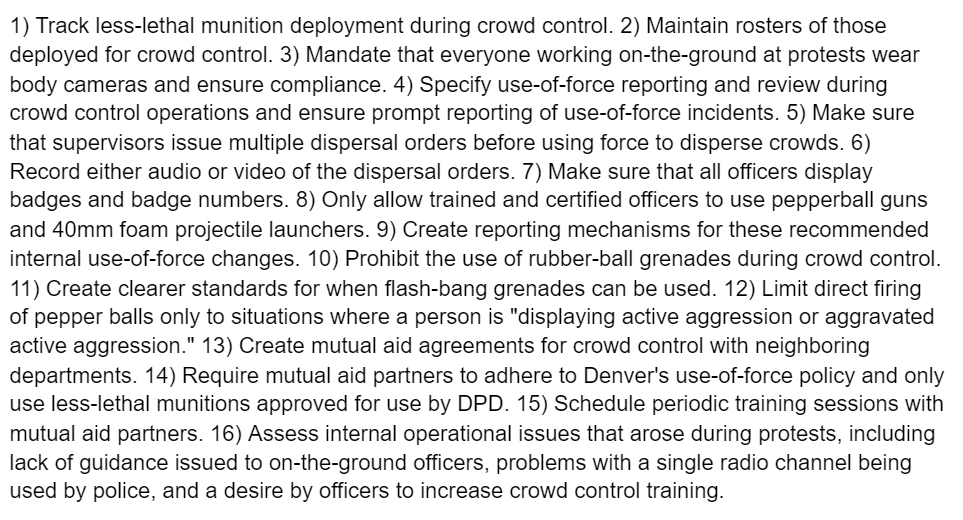The Independent Monitor just released a report looking at how Denver police responded to the George Floyd protests. The upshot of the report is that there were many issues in how DPD responded to the protests. However, the report stopped short of offering a sweeping rebuke.
55 pages when excluding attachments and endnotes, the report was borne out of an intensive six-month-long review of body-worn camera footage, street camera footage, police helicopter footage, radio communications, law enforcement documentation, and internal policies.
Additionally, the OIM team interviewed dozens of Denver police officers and command staff, community members, and other city employees. Lastly, the team surveyed academic research and best practice literature related to law enforcement crowd control and less-lethal munitions.
The report focuses on three areas in which DPD had major issues during the first five days of the George Floyd protests in Denver: use-of-force, mutual aid from outside law enforcement agencies, and operational leadership.
Some examples of the issues noted in the report include a lack of tracking for who was deployed in the field for the first days of the protests and what and how many less-lethal munitions were deployed and by whom.
The report criticized the fact that DPD had zero mutual aid agreements related to crowd control with the 18 neighboring departments that provided assistance, which created mismatches in use-of-force policies and what less lethal munitions could be used during the protests.
Finally, the Denver Police Department leadership may have been lackluster in overseeing overall operations during the protests.
The report is not quite as scathing as some protesters who were on the receiving end of the deployment of less-lethal munitions may have expected.
Noting 2 narratives between citizens, who expressed a belief that DPD responded excessively, & others, who pointed to injuries suffered by officers, property damage, & what happened elsewhere as evidence that the force was necessary, the report does not make a final judgement.
There were major documentary gaps: failure to track the use of less-lethal munitions, vague use-of-force incident reports, & alleged misconduct not always being captured on video, "it was impossible for the OIM to evaluate these competing claims or to resolve them” in the report.
Aside from the findings and recommendations, the report also shows, in unprecedented detail, what happened during the first five days of the George Floyd protests in Denver. Some of the most noteworthy highlights from this description of events are:
DPD was caught largely off-guard by the size & scale of the protests on May 28, when the demonstrations first began in Denver. As clashes between police and protesters ensued that day, multiple DPD teams began reporting that they had run out of less-lethal munitions by 1030 p.m.
DPD then started calling neighboring law enforcement agencies to ask for less-lethal munition resupplies. On May 29, the second day of the protests, DPD first called in outside law enforcement agencies to help.
During these early days, DPD was so concerned about waning stockpiles of less-lethal munitions that the Colorado State Patrol flew its plane to Wyoming to purchase less-lethal munitions directly from a manufacturer, including an order that had been placed by DPD.
Over the first five days of the George Floyd protests in Denver, DPD purchased over $200,000 in less-lethal munitions. The department also acquired an unknown amount of less-lethal munitions from neighboring law enforcement agencies.
To learn more about the report, here’s a piece we published today. Also, the full report is attached at the bottom of the article. https://twitter.com/ConorMichael28/status/1336322405086625795

 Read on Twitter
Read on Twitter



